
Chiang Kai-shek was a Chinese politician, revolutionary, and military commander who was the leader of the Nationalist Kuomintang (KMT) party and commander-in-chief and Generalissimo of the National Revolutionary Army (NRA) from 1926, and leader of the Republic of China (ROC) in mainland China from 1928. After Chiang was defeated in the Chinese Civil War by the Chinese Communist Party (CCP) in 1949, he continued to lead the Republic of China on the island of Taiwan until his death in 1975. He was considered the legitimate head of China by the United Nations until 1971.
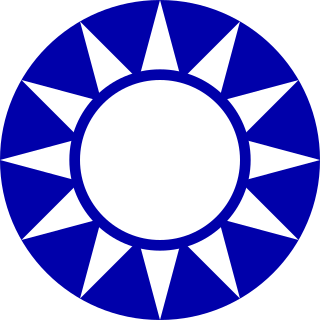
The Kuomintang (KMT), also referred to as the Guomindang (GMD), the Nationalist Party of China (NPC) the Chinese Nationalist Party (CNP), or the National People's Party of China, is a major political party in the Republic of China, initially based on the Chinese mainland and then in Taiwan since 1949. The KMT is a centre-right to right-wing party and the largest in the Pan-Blue Coalition, one of the two main political groups in Taiwan. Its primary rival is the Democratic Progressive Party (DPP), the largest party in the Pan-Green Coalition. As of 2024, the KMT is the largest single party in the Legislative Yuan. The current chairman is Eric Chu.
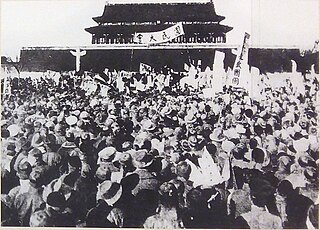
The May Fourth Movement was a Chinese cultural and anti-imperialist political movement which grew out of student protests in Beijing on May 4, 1919. Students gathered in front of Tiananmen to protest the Chinese government's weak response to the Treaty of Versailles decision to allow the Empire of Japan to retain territories in Shandong that had been surrendered by the German Empire after the Siege of Tsingtao in 1914. The demonstrations sparked nation-wide protests and spurred an upsurge in Chinese nationalism, a shift towards political mobilization away from cultural activities, and a move towards a populist base, away from traditional intellectual and political elites.

Chen Duxiu was a Chinese revolutionary socialist, educator, philosopher and author, who co-founded the Chinese Communist Party (CCP) with Li Dazhao in 1921. From 1921 to 1927, he served as the Communist Party's first general secretary. Chen was a leading figure in both the Xinhai Revolution that overthrew the Qing dynasty and the May Fourth Movement for scientific and democratic developments in the early Republic of China. After his expulsion from the CCP in 1929, Chen was for a time the leader of China's Trotskyist movement.
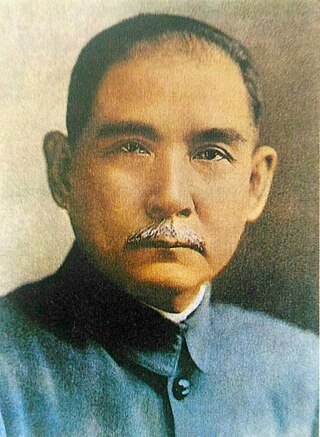
The Three Principles of the People is a political philosophy developed by Sun Yat-sen as part of a philosophy to improve China during the Republican Era. The three principles are often translated into and summarized as nationalism, democracy, and the livelihood of the people. This philosophy has been claimed as the cornerstone of the nation's policy as carried by the Kuomintang; the principles also appear in the first line of the national anthem of Taiwan.
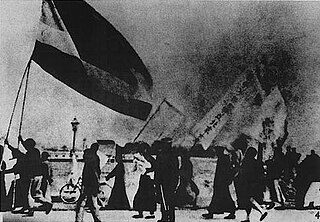
Chinese nationalism is a form of nationalism which asserts that the Chinese people are a nation and promotes the cultural and national unity of all Chinese people. According to Sun Yat-sen's philosophy in the Three Principles of the People, Chinese nationalism is evaluated as multi-ethnic nationalism, which should be distinguished from Han nationalism or local ethnic nationalism.

Yan Xishan was a Chinese warlord who served in the government of the Republic of China. He effectively controlled the province of Shanxi from the 1911 Xinhai Revolution to the 1949 Communist victory in the Chinese Civil War.
The New Culture Movement was a progressive sociopolitical movement in China during the 1910s and 1920s. Participants criticized many aspects of traditional Chinese society, in favor of new formulations of Chinese culture informed by modern ideals of mass political participation. Arising out of disillusionment with traditional Chinese culture following the failure of the Republic of China to address China's problems, it featured scholars such as Chen Duxiu, Cai Yuanpei, Chen Hengzhe, Li Dazhao, Lu Xun, Zhou Zuoren, He Dong, Qian Xuantong, Liu Bannong, Bing Xin, and Hu Shih, many classically educated, who led a revolt against Confucianism. The movement was launched by the writers of New Youth magazine, where these intellectuals promoted a new society based on unconstrained individuals rather than the traditional Confucian system. In 1917, Mr. Hu Shih put forward the famous “Eight Principle”, that is, abandon the ancient traditional writing method and use vernacular.
K. H. Ting, Ting Kuang-hsun or Ding Guangxun, was Chairperson emeritus of the Three-Self Patriotic Movement (TSPM) and President emeritus of the China Christian Council, the government-approved Protestant church in China.

The New Life Movement was a government-led civic campaign in the 1930s Republic of China to promote cultural reform and Neo-Confucian social morality and to ultimately unite China under a centralised ideology following the emergence of ideological challenges to the status quo. Chiang Kai-shek as head of the government and the Chinese Nationalist Party launched the initiative on 19 February 1934 as part of an anti-Communist campaign, and soon enlarged the campaign to target the whole nation.

The Reorganized National Government of the Republic of China, commonly described as the Wang Jingwei regime, was a puppet state of the Empire of Japan in eastern China. It existed coterminous with the Nationalist government of the Republic of China under Chiang Kai-shek, which was fighting Japan alongside the other Allies of World War II. The country functioned as a dictatorship under Wang Jingwei, formerly a high-ranking official of the Nationalist Kuomintang (KMT). The region it administered was initially seized by Japan during the late 1930s at the beginning of the Second Sino-Japanese War.

The Blue Shirts Society (BSS)(藍衣社), also known as the Society of Practice of the Three Principles of the People, the Spirit Encouragement Society and the China Reconstruction Society, was a secret ultranationalist faction in the Kuomintang inspired by German and Italian fascists.

The Nationalist government, officially the National Government of the Republic of China, refers to the government of the Republic of China from 1 July 1925 to 20 May 1948, led by the nationalist Kuomintang (KMT) party.

The Provisional Government of the Republic of China was a puppet state of the Empire of Japan that existed in China from 1937 to 1940 during the Second Sino-Japanese War. It had been formed largely on the initiative of Imperial Japanese Army commanders in north China, before securing approval from Japanese government authorities in Tokyo. Thus the Provisional Government had nominal authority in Japanese occupied zones in north China, while to the south the Central China Expeditionary Army established the Reformed Government of the Republic of China in 1938, which had authority in the Yangtze River area. Both essentially served as a local organ of the Japanese military authorities, due to the presence and extensive powers of Japanese advisors within the Provisional Government over native Chinese bureaucrats, and because it never made any attempt to secure international recognition, even from Japan.

The Kuomintang (KMT) is a Chinese political party that ruled mainland China from 1927 to 1949 prior to its relocation to Taiwan as a result of the Chinese Civil War. The name of the party translates directly as "National People's Party of China" or "Chinese National Party" and was historically referred to as the Chinese Nationalists. The party was initially founded on 23 August 1912, by Sun Yat-sen but dissolved in November 1913. It reformed on October 10, 1919, again led by Sun Yat-sen, and became the ruling party in China. After Sun's death, the party was dominated from 1927 to 1975 by Chiang Kai-shek. After the KMT lost the civil war with the Chinese Communist Party in 1949, the party retreated to Taiwan and remains a major political party of the Republic of China based in Taiwan.
Fascist movements gained popularity in many countries in Asia during the 1920s.
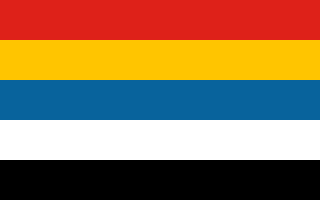
The Republic of China (ROC) began on 1 January 1912 as a sovereign state in mainland China following the 1911 Revolution, which overthrew the Manchu-led Qing dynasty and ended China's imperial history. From 1927, the Kuomintang (KMT) reunified the country and ruled it as a one-party state with Nanjing as the national capital. In 1949, the KMT-led government was defeated in the Chinese Civil War and lost control of the mainland to the Chinese Communist Party (CCP). The CCP established the People's Republic of China (PRC) while the ROC was forced to retreat to Taiwan; the ROC retains control over the Taiwan Area, and its political status remains disputed. The ROC is recorded as a founding member of both the League of Nations and the United Nations, and previously held a permanent seat on the United Nations Security Council until 1971, when the PRC took China's seat in the United Nations General Assembly Resolution 2758. It was also a member of the Universal Postal Union and the International Olympic Committee. The ROC claimed 11.4 million km2 (4.4 million sq mi) of territory, and its population of 541 million in 1949 made it the most populous country in the world.

During the Second Sino-Japanese War, Wang Jingwei, former Premier of the Republic of China and Vice Director-General of the Kuomintang, split from the party in 1939 and established a new Kuomintang in Nanking. Wang, who collaborated with the Japanese, intended to distance the new party from the Kuomintang led by Chiang Kai-shek in Chungking. It was the sole ruling party of the Wang Jingwei regime, a puppet state of the Empire of Japan.

Chiangism, also known as the Political Philosophy of Chiang Kai-shek, or Chiang Kai-shek Thought, is the political philosophy of President Generalissimo Chiang Kai-shek, who used it during his rule in China under the Kuomintang on both the mainland and Taiwan. It is a right-wing authoritarian nationalist ideology based on mostly Tridemist principles mixed with Confucianism. It was primarily practiced as part of the New Life Movement, as well as the Chinese Cultural Renaissance movement. It is influenced by other political ideologies, including socialism, fascism, party-state capitalism, paternalistic conservatism, as well as Chiang's Methodist Christian beliefs.














